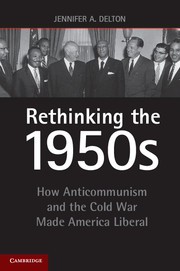Afterword
Published online by Cambridge University Press: 05 October 2013
Summary
The political world we inhabit today in the United States could not be more different than the world I have just described. There is no consensus on fundamental issues. Ideas that were once accepted as the norm – a progressive tax structure, social security, public spending on infrastructure – are now contested at every turn. Liberals no longer have the comfortable cushion of hegemony. Whereas network anchors like Walter Cronkite once reported the news in an apparently objective, neutral fashion, affirming the assumptions of the middle classes and creating the “mainstream,” news shows today have their own perspective and no one really believes there can be such a thing as objectivity or neutrality. Conservative ideas, which once seemed so extreme and out of step with the future, have changed our political-economic landscape, starting with the slashing of tax rates in the 1980s and continuing with the end of welfare as we knew it in the 1990s and the Tea-Partiers’ current obstruction of the passage of once pro forma spending bills. The concept of a moderate Republican is almost unknown today, so complete has the conservative victory over that party been. Whereas once a liberal center composed of members of both major parties staved off extremes on the Left and the Right, today’s politics are polarized by party and ideology, the so- called “Left” coalescing in the Democratic Party and the “Right” in the Republican Party.
- Type
- Chapter
- Information
- Rethinking the 1950sHow Anticommunism and the Cold War Made America Liberal, pp. 153 - 158Publisher: Cambridge University PressPrint publication year: 2013



